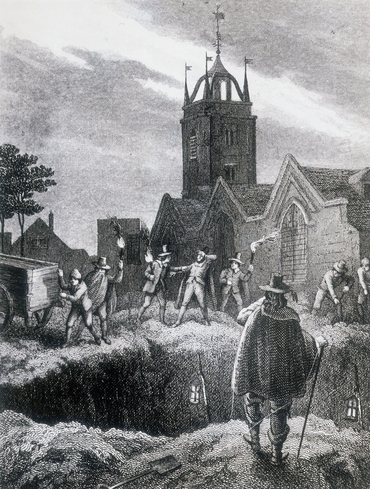In a couple of days we shall be marking the first anniversary of the burning of the great cathedral at the heart of Paris. Because of that, last Easter I presented a special edition of Tales for Our Time excerpted from Victor Hugo's Notre-Dame de Paris. Among those who enjoyed it was Barbara Stockwell, an Arizona member of The Mark Steyn Club:
Words fail me. I was very moved by your reading and the wonderful bells. Simply, thank you!
Thank you, Barbara. And yes, the bells are wonderful. For those who missed my reading last Good Friday, you can find it here. For Easter 2019 one church in Christendom was empty; today almost all are. In tonight's episode of A Journal of the Plague Year by Daniel Defoe, it's sobering to reflect that as a deadly contagion raged through London in 1665 the churches stayed open - and, at the height of the pandemic, full:
As it brought the people into public company, so it was surprising how it brought them to crowd into the churches. They inquired no more into whom they sat near to or far from, what offensive smells they met with, or what condition the people seemed to be in; but, looking upon themselves all as so many dead corpses, they came to the churches without the least caution, and crowded together as if their lives were of no consequence compared to the work which they came about there. Indeed, the zeal which they showed in coming, and the earnestness and affection they showed in their attention to what they heard, made it manifest what a value people would all put upon the worship of God if they thought every day they attended at the church that it would be their last.
Nor was it without other strange effects, for it took away, all manner of prejudice at or scruple about the person whom they found in the pulpit when they came to the churches. It cannot be doubted but that many of the ministers of the parish churches were cut off, among others, in so common and dreadful a calamity; and others had not courage enough to stand it, but removed into the country as they found means for escape. As then some parish churches were quite vacant and forsaken, the people made no scruple of desiring such Dissenters as had been a few years before deprived of their livings by virtue of the Act of Parliament called the Act of Uniformity to preach in the churches; nor did the church ministers in that case make any difficulty of accepting their assistance; so that many of those whom they called silenced ministers had their mouths opened on this occasion and preached publicly to the people.
Here we may observe and I hope it will not be amiss to take notice of it that a near view of death would soon reconcile men of good principles one to another, and that it is chiefly owing to our easy situation in life and our putting these things far from us that our breaches are fomented, ill blood continued, prejudices, breach of charity and of Christian union, so much kept and so far carried on among us as it is. Another plague year would reconcile all these differences; a close conversing with death, or with diseases that threaten death, would scum off the gall from our tempers, remove the animosities among us, and bring us to see with differing eyes than those which we looked on things with before.
To listen to the twenty-second episode of A Journal of the Plague Year, please click here and log-in. If you're late getting started on this current Tale, you'll find the story so far here.
Tales for Our Time began as an experimental feature we introduced as a bonus for Mark Steyn Club members, and, as you know, I said if it was a total stinkeroo, we'd eighty-six the thing and speak no more of it. But I'm thrilled to say it's proved very popular, and is now in its third season. If you're a Club member and you incline more to the stinkeroo side of things, give it your best in the comments section below. But, either way, do join me tomorrow evening for Part Twenty-Three of A Journal of the Plague Year.
























